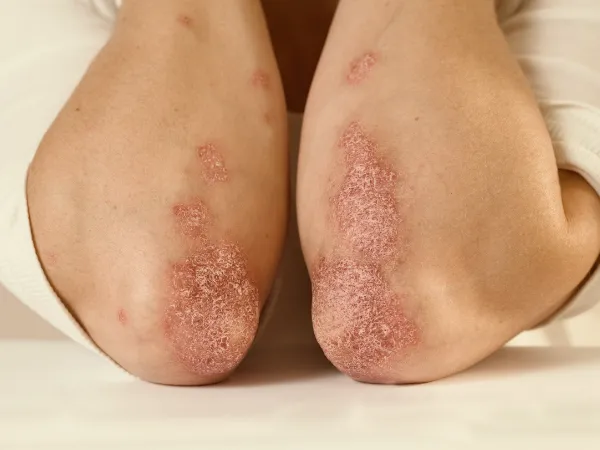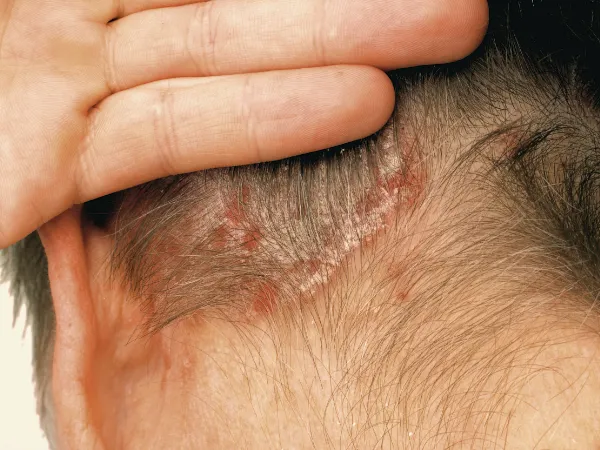1era consulta de pago – No aseguradoras (excepto reembolso)
1era consulta de pago – No aseguradoras (excepto reembolso)
Take control of your skin, restore your well-being
When the skin regeneration cycle speeds up more than it should, psoriasis appears unexpectedly: visible lesions, inflammation, and discomfort that can disrupt your routine and well-being.
At Instituto Dermatológico García-Legaz, we understand what you’re going through. That’s why we offer treatments specifically designed to help relieve symptoms and restore the balance your skin needs.

Understand its symptoms
While skin cells normally renew every month, with psoriasis this process occurs in just days, leading to a buildup of cells that form visible plaques on the skin’s surface.
This autoimmune condition, which affects approximately 3% of the global population, appears in the form of flare-ups that can occur anywhere on the body—although it is most common on the scalp, elbows, knees, and lower back.
Each case is unique, but the most common symptoms include:
What causes or influences it?
Psoriasis is a chronic skin condition that can appear at any stage of life and affects both men and women equally. Although its exact cause is still not fully understood, various factors can influence its onset and the intensity of flare-ups.
Psoriasis is a condition with a strong hereditary component and an autoimmune origin, where the immune system mistakenly accelerates the renewal of skin cells.
Various factors can trigger or worsen flare-ups, including:

Skin injuries, such as cuts, bumps, scrapes, or insect bites, can trigger the appearance of new plaques in previously unaffected areas—this phenomenon is known as the Koebner effect.
The importance of proper diagnosis
Early detection of psoriasis is key to preventing complications, controlling its progression, and minimizing its impact on your quality of life. A timely diagnosis allows treatment to begin before symptoms worsen.
The most common types of psoriasis are:
Take control of this condition
Psoriasis is a chronic condition which, although it has no definitive cure, can be controlled through various treatments.
The choice of treatment depends on the severity of the disease, the type of psoriasis, and each person’s individual characteristics. At Instituto Dermatológico García-Legaz, we use the most innovative options to control flare-ups, relieve symptoms, and keep your skin in the best possible condition.
Creams containing corticosteroids, vitamin D derivatives, or retinoids help reduce inflammation, relieve itching, and normalize the skin cell renewal cycle.
This treatment uses controlled ultraviolet radiation to reduce the overactivity of skin cells, which is a hallmark of psoriasis.
This therapeutic approach mimics the beneficial effects of sunlight, helping to reduce inflammation, relieve itching, and slow the formation of plaques.
These systemic treatments are suitable for moderate to severe cases of psoriasis. They work by modulating the immune response, reducing inflammation, and controlling excessive cell proliferation.
Due to their potency, these treatments require strict medical supervision to ensure their effectiveness and minimize potential side effects.
Frequently Asked Questions
Still have questions?
We've got the answers.
No, psoriasis is not contagious.
It is an autoimmune disease caused by an abnormal response of the immune system, which means it is not transmitted through physical contact, air, water, or fluid exchange.
Yes, stress is one of the main factors that can trigger or worsen psoriasis flare-ups.
When the body is under high levels of emotional stress, the immune system becomes altered, which can increase inflammation and worsen symptoms.
Yes, regular exercise is highly beneficial for people with psoriasis.
Physical activity not only helps to reduce stress, but also supports maintaining a healthy weight, which may reduce the severity of flare-ups. Additionally, exercise improves mood and strengthens the immune system.
It’s recommended to choose low-impact activities, such as walking, cycling, or practicing yoga—especially if you experience joint discomfort related to psoriatic arthritis.